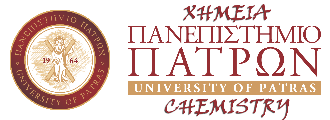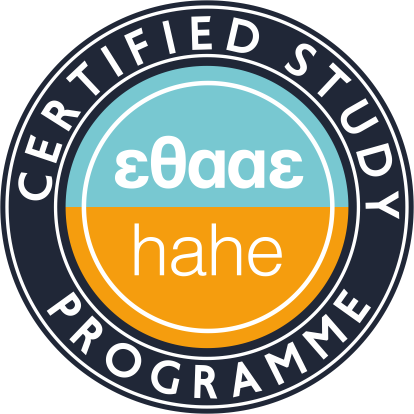 |
With the co-funding of Greece and the European Union |
Professor
Tel: (+302610) 997905
e-mail:
Web Page: http://www.chem.upatras.gr/faculty/tselios
List of Publications:
Contact hours: Wednesday and Friday 11:00-13:00
Research Project
Title of research project: Development of targeted hormone-dependent cancer therapy
Acronym: ORAMA
Code: Τ2ΕΔΚ-02056
More information is available in official webpage: https://www.oramanetwork.gr/
Participants:
Department of Chemistry, University of Patras, Greece
Research Organization (http://www.chem.upatras.gr/el)
School of Medicine, University of Crete, Greece
Research Organization (http://www.english.med.uoc.gr/)
EXCELYA S.A. (Coordinator)
Enterprise (https://www.excelya.com/)
Sort description:
The gonadotropin releasing hormone GnRH (or LHRH: luteinizing hormone-releasing hormone) is a decapeptide that controls the release of the gonadotropin hormones luteinizing hormone (LH) and follicle stimulating hormone (FSH). Since its discovery, modified peptide analogues of GnRH have been used to treat cancer. GnRH receptors are considered targets for the treatment of hormone-dependent cancers as they are highly expressed in different types of cancer cells. They are expressed in 80 % and 86 % of ovarian and endometrial cancers and 50 % in prostate and breast cancers. Anticancer drugs (antineoplastics) are powerful and very effective but may have serious side effects. For this reason, efforts have been made towards their selective and targeted delivery to reduce their harmful side effects and to achieve better efficacy. Targeted cancer treatment is a challenge, not only to the scientific community, but also to the pharmaceutical industry. In this project, we intend to develop a novel product including an antineoplastic factor bound to a peptide analogue of GnRH. The conjugation will be achieved via a disulfide bond (innovation 1). Selective and quantitative release of the antineoplastic compound will happen by the thioredoxin system that is overexpressed in cancers and is known to selectively reduce disulfides. In addition, mitoxantrone will be used as antineoplastic factor (innovation 2). Mitoxantrone has reduced side effects compared to already used in other conjugates doxorubicin. Finally, the C-terminus of the GnRH peptide bound to mitoxantrone will be modified to ethylamide, as it is existed in Leuprolide (innovation 3).
Objectives – Expected results
The development of the proposed improved and targeted cancer treatment includes the following actions: (i) rational design and synthesis of product; (ii) in vitro evaluation and pharmacological studies (binding, endocytosis and signaling studies) using different types of cancer cells that express GnRH receptor; (iii) stability studies and (iv) in vivo evaluation of synthesised product in experimental hormone-dependent cancer animal model.
The goal is to reduce the side effects of chemotherapy with better efficacy. The use of a GnRH peptide analogues linked to cytostatic / cytotoxic agents may be a successful approach to the development of targeted therapy by reducing the serious side effects of cytotoxic drugs.
Title of research project: Development of an advanced humanized mouse model for multiple sclerosis: application for pre-clinical studies and drug testing
Acronym: AKESO
Code: Τ1ΕΔΚ-01859
More information is available in official webpage: https://www.akeso4ms.gr/
Participants:
Hellenic Pasteur Institute
Research Organization (www.pasteur.gr)
Department of Chemistry, University of Patras, Greece
Research Organization (https://www.chem.upatras.gr)
VIANEX S.A. (Coordinator)
Enterprise (www.vianex.gr); Plant D, Industrial Area of Patras, Greece
Short description:
Multiple Sclerosis (MS) is a chronic inflammatory demyelinating disease of the central nervous system (CNS). Existing experimental animal models of MS are excellent for describing CD4+ T cell-mediated immune responses, but fail to depict other important parameters of MS such as the involvement of B and CD8+ T cells, and the oxidative injury involved in neurodegeneration and possibly also in the transition from the relapsing-remitting to the progressive form of the disease. They also often fail to predict the efficacy and safety of new treatments in humans.
In the AKESO research project we intend to create, for the first time, a fully humanized mouse model of the human immune system in order to study both its function and dysfunction in MS (DR2.MS mice). We will use a new line of severely immunocompromised mice (B2m-NOG), which is one of the most state-of-the-art models for transplantation studies. These lymphopenic mice will serve as recipients of human immune system development by transplantation of human peripheral blood monocytes (PBMC), which include human T and B lymphocytes, myeloid antigen-presenting cells, and a small percentage of stem cells (hematopoietic stem cells- hHSC). This approach has yielded significant results for other autoimmune diseases in recent years.
Objectives – Expected results
1) To develop an advanced humanized mouse model for Multiple Sclerosis (MS), which for the first time will represent human T- as well as B- mediated cell autoimmunity in the pathogenesis of the disease.
2) To demonstrate the role of autoimmunity in the pathogenesis of MS.
3) To create a new improved pre-clinical model for testing new molecules that will target the human immune system for the treatment of MS.
4) To understand the mechanism of immune tolerance induced by ELMog and confirm that it induces T cell tolerance in human T cells and protects DR2.MS mice from disease.
Curriculum Vitae
Associate Professor Theodore Tselios was born in Messolonghi, Greece. He obtained his diploma (Chemistry) in 1994, PhD (Organic Chemistry) in 2001 and MSc (Medicinal Chemistry) in 2003 from the Department of Chemistry, University of Patras. He has joined several times, as a visiting scientist, collaborating laboratories abroad such as Austin Research Institute, Melbourne Australia, School of Chemistry, University of Cardiff, UK, Department of Chemistry, University of Florence Italy etc.
He has been honoured by "Leonidas Zervas foundation" of Greece (1998) and he had a scholarship by the State Scholarship’s Foundation of Greece, (2002-2003).
He has published seventy (70) research articles, 52 the last ten years, in the field of rational drug design, synthesis and evaluation of bioactive molecules. He has twenty-two publications (22) as first or second author and twenty-eight (28) as corresponding author in several journals. Nine (9) research articles were published in "Journal of Medicinal Chemistry", one (1) in "Brain" and four (4) reviews in "Current Medicinal Chemistry". He has published nine (9) book chapters, forty-seven (47) abstracts in international conferences, seventy-three (73) international conference proceedings and ninety-five (95) national (Greek) conference abstracts. Moreover, figures of his research articles have been selected as cover pages in four (4) issues of "Current Medicinal Chemistry".
He has participated in the Organizing Committee of International Conferences (32nd European Peptide Symposium, 32nd and 29th Cyprus-Camerino-Noordwijkerhout: Trends in Drug Research Medicinal Chemistry EFMC Symposium, SEEDRUG project: NMR Applications in Life Sciences - Exploring Peptides & Proteins).
Since 2004, he has joined the faculty of Chemistry Department of the University of Patras as a Lecturer (2004-2009), Assistant Professor (2009-2015) and Associate Professor (2015-today).
Courses
Undergraduate teaching
Lectures:
- "Organic Chemistry III" - Department of Chemistry (until 2011)
- "Organic Chemistry" - Department of Chemical Engineering (until 2011).
- "Organic Chemistry of Functional Groups I" - Department of Chemistry.
- "Organic Chemistry of Functional Groups II" - Department of Chemistry.
- "Experimental Organic Chemistry I" (Theory) - Department of Chemistry.
- "Experimental Organic Chemistry II" (Theory) - Department of Chemistry.
Laboratories:
- Experimental Organic Chemistry I - Department of Chemistry.
- Experimental Organic Chemistry II - Department of Chemistry.
Graduate teaching
Lectures:
- "NMR Spectroscopy and Molecular Design" - Interdepartmental Master Degree Program "Medicinal Chemistry: Drug Discovery and Design", Departments of Chemistry, Pharmacy & Medicine (until 2018).
- "Synthetic Inorganic, Organic & Organometallic Chemistry" (Heterocyclic Chemistry) - Master Degree Program "Synthetic Chemistry & Advanced Polymeric & Nanostructured Materials", Department of Chemistry (until 2018).
- "Structural and Computational Medicinal Chemistry" - Interdepartmental Master Degree Program "Medicinal Chemistry and Chemical Biology", Departments of Chemistry & Medicine.
Laboratory:
- "Laboratory of Medicinal Chemistry" (Synthetic Chemistry & Molecular Design) - Interdepartmental Master Degree Program "Medicinal Chemistry: Drug Discovery and Design", Departments of Chemistry, Pharmacy & Medicine (until 2018).
Research Activities
- Organic, Peptide and Medicinal Chemistry. Rational design and synthesis of linear, cyclic peptide analogues and non-peptide mimetics.
- Conformational studies and Molecular Modelling of bioactive and pharmaceutical molecules. Interactions of bioactive molecules (docking studies). Pharmacophore analysis. Homology Modelling.
Patents
- Matsoukas, T. Tselios, V. Apostolopoulos. “Peptide analogues of Myelin Basic Protein epitopes in the treatment of Experimental Autoimmune Encephalomyelitis (EAE) and Multiple Sclerosis (MS)”. GPO AGIK 38/17, CO7K 14/47, 09/05/2002/USA.
- Matsoukas, T. Tselios et al. “Peptide Analogues and Conjugates Thereof”: PCT/IB2008/003493, WO 2009/066175, (28.05.2009), European No. 08851987.1 / 1402/2227486 (Granted). Short Description: “MBP analogues conjugated with mannan using KLH bridge”.
- Tselios et al. “Immunotherapy of Multiple Sclerosis Using Mannosylated Peptides as Therapeutic Vaccines”: PCT/IB2009/000382, WO 2009/093143 (30.07.2009). Greece (ΟΒΙ) Νο. 1006998/30.09.2010 (Granted). European No. 09703874.9 / 1412/2240200 (Granted); Short Description: “MBP analogues conjugated with mannan via KGn bridge”. Divisional No. 14156495.5 (Granted); Short Description: “MOG analogues conjugated with mannan via KGn bridge”. Australia No. 2009207345 (Granted); Short Description: “MOG analogues conjugated with mannan via KGn bridge”. Divisional No. 2014200921 (Granted); Short Description: “MBP analogues conjugated with mannan via KGn bridge”. USA No. 12/864,019 (Granted); Short Title: “Conjugates comprising mannan and myelin oligodentrocyte glycoprotein (MOG)”; Short Description: “MOG analogues conjugated with mannan via KGn bridge”. Divisional: No. 14/877,679 (Granted); Short Title: “Conjugates comprising mannan and myelin basic protein (MBP)”; Short Description: “MBP analogues conjugated with mannan via KGn bridge”.
Representative Publications
- E.D. Mantzourani, T. Tselios*, S. Golič Grdadolnik, J.A. Platts, A. Brancale, G. Deraos, J.M. Matsoukas, T.M. Mavromoustakos*. Comparison of Proposed Putative Active Conformations of Linear Altered Peptide Ligands of Myelin Basic Protein Epitope 87-99 by Spectroscopic and Modelling studies: The Role of Position 91 and 96 in T-cell Receptor Activation. J. Med. Chem., 2006, 49, 6683-6691.
- Spyranti, G.A. Dalkas, G.A. Spyroulias*, E.D. Mantzourani, T. Mavromoustakos, I. Friligou, J.M. Matsoukas, Tselios T.V.*. Putative Bioactive Conformations of Amide Linked Cyclic Myelin Basic Protein Peptide Analogues Associated with Experimental Autoimmune Encephalomyelitis. J. Med. Chem., 2007, 29, 50(24): 6039-6047.
- T. Matsoukas, P. Zoumpoulakis, T. Tselios*. Conformational analysis of aliskiren, a potent renin inhibitor, using high-resolution nuclear magnetic resonance and molecular dynamics simulations. J. Chem. Inf. Model., 2011, 26;51(9): 2386-2397.
- Taoufik, V. Tseveleki, S.Y. Chu, T. Tselios, M. Karin, H. Lassmann, DE. Szymkowski, L. Probert*. Transmembrane tumour necrosis factor is neuroprotective and regulates experimental autoimmune encephalomyelitis via neuronal nuclear factor-kappaB. Brain, 2011, 134(9): 2722-2735.
- Laimou, T. Katsila, J. Matsoukas, A. Schally, K. Gkountelias, G. Liapakis, C. Tamvakopoulos, T. Tselios*. Rationally designed cyclic analogues of luteinizing hormone-releasing hormone: enhanced enzymatic stability and biological properties. Eur. J. Med. Chem., 2012, 58: 237-247.
- T. Matsoukas, A. Cordomí, S. Ríos, L. Pardo, T. Tselios*. Ligand binding determinants for angiotensin II type 1 receptor from computer simulations. J. Chem. Inf. Model., 2013, 25, 53(11): 2874-2883..
- Tseveleki, T. Tselios*, I. Kanistras, O. Koutsoni, M. Karamita, S.S. Vamvakas, V. Apostolopoulos, E. Dotsika, J. Matsoukas, H. Lassmann, L. Probert*. Immunotherapy of autoimmune encephalomyelitis using mannan-conjugated peptides to target antigen-presenting cells: A pre-clinical study in mice. Exp. Neurol., 2015, 267: 254-267.
- P. Yannakakis, C. Simal, H. Tzoupis, M. Rodi, N. Dargahi, M. Prakash, A. Mouzaki, J.A. Platts, V. Apostolopoulos*, T.V. Tselios*. Design and Synthesis of Non-Peptide Mimetics Mapping the Immunodominant Myelin Basic Protein (MBP83-96) Epitope to Function as T-Cell Receptor Antagonists. Int. J. Mol. Sci., 2017, 18(6), pii: E1215. doi: 10.3390/ijms18061215.
- G. Kordopati, H. Tzoupis, A.N. Troganis, G.M. Tsivgoulis, S. Golic Grdadolnik, C. Simal, T.V. Tselios*. Biologically relevant conformational features of linear and cyclic proteolipid protein (PLP) peptide analogues obtained by high-resolution nuclear magnetic resonance and molecular dynamics. J. Comput. Aided Mol. Des., 2017, 31(9): 841-854.
- Tapeinou, E. Giannopoulou, C. Simal, B.E. Hansen, H. Kalofonos, V. Apostolopoulos, A. Vlamis-Gardikas, T. Tselios*. Design, synthesis and evaluation of an anthraquinone derivative conjugated to myelin basic protein immunodominant (MBP85-99) epitope: Towards selective immunosuppression. Eur. J. Med. Chem., 2018, 143: 621-631.





